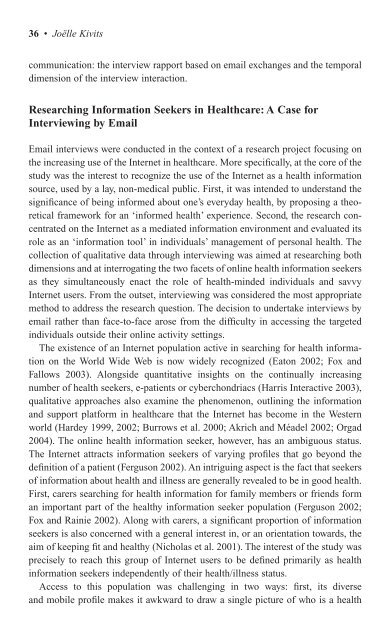Virtual Methods
Virtual Methods
Virtual Methods
You also want an ePaper? Increase the reach of your titles
YUMPU automatically turns print PDFs into web optimized ePapers that Google loves.
36 • Joëlle Kivits<br />
communication: the interview rapport based on email exchanges and the temporal<br />
dimension of the interview interaction.<br />
Researching Information Seekers in Healthcare: A Case for<br />
Interviewing by Email<br />
Email interviews were conducted in the context of a research project focusing on<br />
the increasing use of the Internet in healthcare. More specifically, at the core of the<br />
study was the interest to recognize the use of the Internet as a health information<br />
source, used by a lay, non-medical public. First, it was intended to understand the<br />
significance of being informed about one’s everyday health, by proposing a theoretical<br />
framework for an ‘informed health’ experience. Second, the research concentrated<br />
on the Internet as a mediated information environment and evaluated its<br />
role as an ‘information tool’ in individuals’ management of personal health. The<br />
collection of qualitative data through interviewing was aimed at researching both<br />
dimensions and at interrogating the two facets of online health information seekers<br />
as they simultaneously enact the role of health-minded individuals and savvy<br />
Internet users. From the outset, interviewing was considered the most appropriate<br />
method to address the research question. The decision to undertake interviews by<br />
email rather than face-to-face arose from the difficulty in accessing the targeted<br />
individuals outside their online activity settings.<br />
The existence of an Internet population active in searching for health information<br />
on the World Wide Web is now widely recognized (Eaton 2002; Fox and<br />
Fallows 2003). Alongside quantitative insights on the continually increasing<br />
number of health seekers, e-patients or cyberchondriacs (Harris Interactive 2003),<br />
qualitative approaches also examine the phenomenon, outlining the information<br />
and support platform in healthcare that the Internet has become in the Western<br />
world (Hardey 1999, 2002; Burrows et al. 2000; Akrich and Méadel 2002; Orgad<br />
2004). The online health information seeker, however, has an ambiguous status.<br />
The Internet attracts information seekers of varying profiles that go beyond the<br />
definition of a patient (Ferguson 2002). An intriguing aspect is the fact that seekers<br />
of information about health and illness are generally revealed to be in good health.<br />
First, carers searching for health information for family members or friends form<br />
an important part of the healthy information seeker population (Ferguson 2002;<br />
Fox and Rainie 2002). Along with carers, a significant proportion of information<br />
seekers is also concerned with a general interest in, or an orientation towards, the<br />
aim of keeping fit and healthy (Nicholas et al. 2001). The interest of the study was<br />
precisely to reach this group of Internet users to be defined primarily as health<br />
information seekers independently of their health/illness status.<br />
Access to this population was challenging in two ways: first, its diverse<br />
and mobile profile makes it awkward to draw a single picture of who is a health



